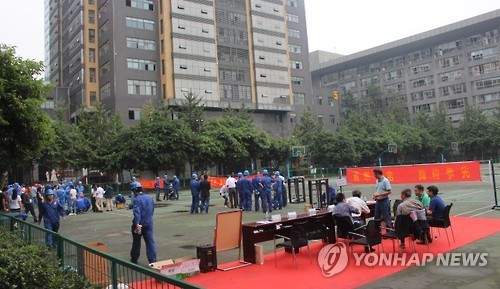South Korean companies lag behind their Chinese counterparts in industries identified as new growth engines for the economy, a study found Thursday.
The Korean Economic Research Institute, a private think tank, identified the top 100 global companies in each of the three main industries, including health care, software and sensor networks, which have been defined as future engines for economic growth. The main industries were divided into nine subcategories.
 |
A venture incubator Sync Zone in Chengdu, China |
It said South Korean companies in the industries have a weak presence, a signal the country is unprepared to turn around the ailing economy.
The study emphasized a comparison between South Korea and China in the wake of an escalating rivalry in the manufacturing sector where Korean firms generally hold better competitive advantage such as in smartphones and home appliances.
Samsung Electronics, for instance, has a 21.8 percent of the total smartphone market share, whereas top three Chinese companies -- Huawei, Oppo and Xiaomi -- make up 15.1 percent in total.
Among the 100 top IT service providers, Samsung SDS ranked No. 33 and was the only South Korean company listed, compared to six Chinese players.
In the software industry, led by global players Microsoft and Oracle, 17 Chinese companies were included while there were only seven South Korean businesses, with Korea Smart Card leading the pack at No. 40.
Only two Korean companies made to the top 100 list in the application software sector, with the highest-ranked South Korean company being Com2uS at No. 79. That compared to 20 Chinese companies on the list.
The medical equipment and supplies sector saw six Chinese companies on the list, while 20 of them were on the pharmaceuticals list. Not a single South Korean firm was named on either lists.
Korean companies fared better in the top 100 for biotechnology, with four firms on the list and Celltrion Healthcare ranking 18th. But China boasted 13 players on the list.
The poor performance of South Korean companies is mainly due to lack of mergers and acquisitions and insufficient investment in research and development, according to the study.
The findings emphasized that South Korean companies need to break into the top 20 in each industry in order to have a competitive edge.
It also called for government support and more aggressive investments in M&A and R&D.
By Park Ga-young (gypark@heraldcorp.com">
gypark@heraldcorp.com)








![[Today’s K-pop] Blackpink’s Jennie, Lisa invited to Coachella as solo acts](http://res.heraldm.com/phpwas/restmb_idxmake.php?idx=644&simg=/content/image/2024/11/21/20241121050099_0.jpg)